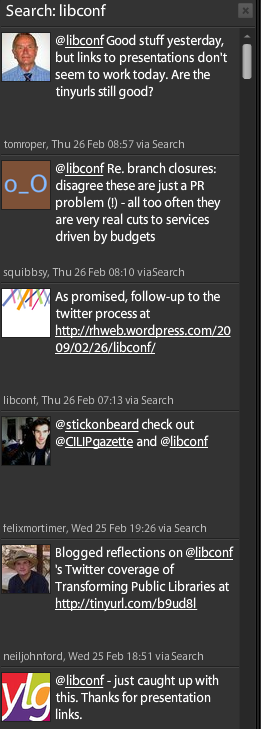Reflections of Live Blogging at the ‘Transforming Public Libraries’ Conference
Posted by Brian Kelly on 2nd March 2009
 I recently received an email from Ian Edelman, Web Manager for Recreation and Heritage at Hampshire County Council. Ian had decided to experiment with Twitter to provide a live blogging channel for the one day ‘Transforming Public Libraries’ conference held in Winchester on 26thFebruary 2009. I’d spoken to Ian at last year’s Museums and the Web 2008 conference about Twitter, where Twitter’s use during the conference had had a very high profile. Ian was also aware that I was a fan of this micro-blogging tool and so we had a chat about how it could be used to support live blogging at a conference.
I recently received an email from Ian Edelman, Web Manager for Recreation and Heritage at Hampshire County Council. Ian had decided to experiment with Twitter to provide a live blogging channel for the one day ‘Transforming Public Libraries’ conference held in Winchester on 26thFebruary 2009. I’d spoken to Ian at last year’s Museums and the Web 2008 conference about Twitter, where Twitter’s use during the conference had had a very high profile. Ian was also aware that I was a fan of this micro-blogging tool and so we had a chat about how it could be used to support live blogging at a conference.
The aims were of the live blogging service, it seems, were two-fold: to maximise engagement with the strategic issues raised at the conference to an audience beyond those physically present and to gain experiences in use of Twitter.
Judging by a blog post entitled “Well played HCC!!!” published on the Neil’s Random Letters blog the experiment was a great success. In the post the author suggested that “we all have to stand up and give a round of applause to HCC for making it accessible to the broader community“.
I suspect that I added to the numbers in the remote audience when I tweeted “The @libconfID is now liveblogging the Transforming Public Libraries Conference – http://is.gd/kNdL“. In particular this resulted in Sarah Washford describing how she was “Watching the twitter stream from the Public Libs conf @libconf – so far not very challenging or inspiring I’m afraid“. However Sarah’s initial reservations seem to have changed during the day, as later on she said that “@libconf The twittering is great and creating some interesting debates. ‘Inspiring’ quote was more about some ideas we’ve heard many times“.
Now as well as Twitter being used to post summaries of the presentations and discussions held during the day, the ‘libconf’ tag was also suggested as a way of aggregating comments and questions from others, including the remote audience. As can be seen from the accompanying image (taken from a search for ‘libconf’ in the Tweetdeck Twitter client) there were significant discussions taking place after the event as well as during it, as you can see for yourself.
Ian has already posted his reflections on the experiment. I’d like to add a few more suggestions:
- Make use of Slideshare: Rather than providing access to the speaker’s PowerPoint files (or PDF version of the files) hosting them on Slideshare allows the slides to be viewed more easily and for comments to me made.
- Consider use of a dedicated live blogging tool: Although Twitter is growing in popularity, it has shortcomings as a live blogging tool: followers of someone who is using Twitter to live blog may not appreciate the copious numbers of tweets received and it can be difficult to integrate the comments which are dispersed over multiple Twitter accounts, particularly if the event tag is omitted or misspelled. A tool such as Coveritlive or ScribbleLive may provide a more useful alternative.
- Provide an Acceptable Use Policy: It may be useful to provide an Acceptable Use Policy for the event, so that everyone is aware that live blogging is happening and that you have contingency plans in case participants want to make contributions which they do not want to be divulged to a wider audience.
Any other comments people would like to suggest?
Posted in Events | Comments Off
